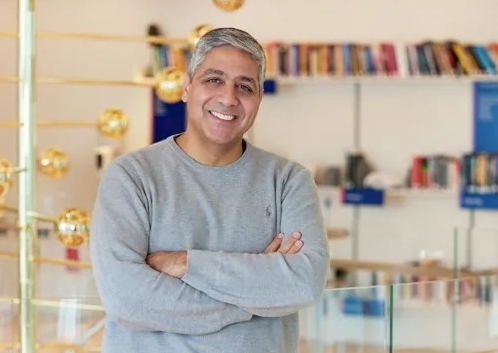The Scoop
Google is putting a new executive in charge of coordinating future AI-powered product development, according to a company memo from CEO Sundar Pichai that was reviewed by Semafor.
Koray Kavukcuoglu, Google DeepMind’s chief technology officer, will become the company’s chief AI architect, a new senior vice president role reporting directly to Pichai.
Kavukcuoglu, a former aerospace engineer, earned a PhD in computer science and worked under AI pioneer Yann LeCun at NYU. (LeCun later joined Facebook to lead its AI efforts.) Kavukcuoglu joined DeepMind in 2012 as a researcher, before rising into a leadership role, where he oversaw some of the company’s major advances in AI. He’ll keep his current position while serving in the new role, according to the memo disseminated on Wednesday.
Under Kavukcuoglu, who works closely with DeepMind co-founder and CEO Demis Hassabis, Google came from behind to take the lead in some key AI benchmarks. But the company is under pressure to take the raw capabilities of its Gemini family of models and turn them into successful products.
Kavukcuoglu will “accelerate how we bring our world-leading models into our products, with the goal of more seamless integration, faster iteration, and greater efficiency,” Pichai wrote in the memo.
In recent months, Kavukcuoglu has been working with product leaders at Google to find ways to use the company’s AI models to power new products across the sprawling company.
The new role under Pichai turns that effort into a formal position. Kavukcuoglu will move from London to Mountain View.
In this article:
Know More
Google has been undergoing broad changes as a company since ChatGPT upended the tech industry. It merged DeepMind, a company it acquired in 2010, with Google Brain, and installed Hassabis at the helm of its AI effort.
Across the company, it’s streamlining the way teams work in an effort to speed up product development. That has meant buyouts, layoffs, and leadership changes.
“We’re entering a new phase of the AI platform shift. It will require us to also shift into a new gear as a company to ensure our products are evolving just as quickly as our models,” Pichai wrote in the memo.
In April, Google moved Josh Woodward, head of Google Labs, into the lead role at Gemini. Woodward oversaw the creation of one of the company’s hit AI products called NotebookLM, which turns text into a podcast-like show.
Google is hoping for more successes like NotebookLM. But so far, the pace of innovation on AI models has outpaced product development.
In some ways, there is no way around that. New capabilities must be created before new products can utilize them.
On the other hand, Kavukcuoglu has been working to brief people around the company on where those capabilities are likely to lead so that product developers can think ahead.
In the past, the tech industry could count on a somewhat predictable and constant rate of change, as computers got smaller and faster over time. But AI has not yet settled into a Moore’s Law-like trajectory. Advances come in spurts and have been moving incredibly fast.
If Google doesn’t invent new ways to use AI, there’s a danger its competitors will. In some ways, that is the story of ChatGPT, which used a breakthrough in AI architecture pioneered by Google’s own researchers, at a time when those researchers were encouraged to share their discoveries with the world.
Now, AI is changing the way consumers search the web, with some early adopters using ChatGPT or Perplexity as their search engines.
On Tuesday, The Verge reported the company is offering buyouts in its Search organization — the core of its business that generates the majority of the company’s revenue.
New Gemini capabilities like Project Mariner, which can autonomously control web browsers, and Astra, which can understand the physical world, show the seeds of promising new products.
It’s now the job of Pichai’s newest direct report to see that they end up powering Google’s new products.
Reed’s view
When Google beat out Facebook to acquire DeepMind in 2014, for a price around $500 million, it barely registered for investors. It’s remarkable how central DeepMind has become in Google’s core strategy today.
It has gone from being a largely autonomous research arm in faraway London to being a key part of Google’s transition into a nimbler, bolder company in the AI era.
The Gemini family of models are now widely regarded as the best in the industry. But being the best doesn’t necessarily do much for Google in the short term, if the technology doesn’t translate into consumer products.
The problem with having billions of users who depend on your products and services every day is that you can’t just flip a switch and drastically change them overnight. That’s especially true with Google search, where the blue links are still beloved by the majority of users.
The best route is to invent the competition, but that’s incredibly difficult. And because of a new antitrust attitude in Washington, acquiring a company like YouTube today would be extremely difficult.
In the long run, DeepMind’s success in AI research will probably help the company in new product categories like autonomous cars. Waymo is a great example. Hardware, such as consumer robotics, could be another big area. Google recently announced a partnership with Xreal on AI-powered glasses.
Google already has an extensive line of hardware products in the home that could be enhanced with AI capabilities, especially if they can be connected with Android smartphones and Google’s web products. That’s where more coordination from above could be valuable.
Notable
- In an interview with Alex Kantrowitz, Hassabis said achieving AGI will require massive computational scale and key breakthroughs — advances DeepMind is actively pursuing in its work.


